The Indian gods are entities that make up the Hindu religion, a polytheistic religion, prevalent in India. Hinduism has more than 330 million entities, including gods and their corporeal manifestations, called avatars.
Some of the main Indian gods are:
Brahma
Brahma is the supreme God of Hinduism, creator of the universe. Brahma, in the Hindu religion, has also attributed the creation of other gods and knowledge to himself.
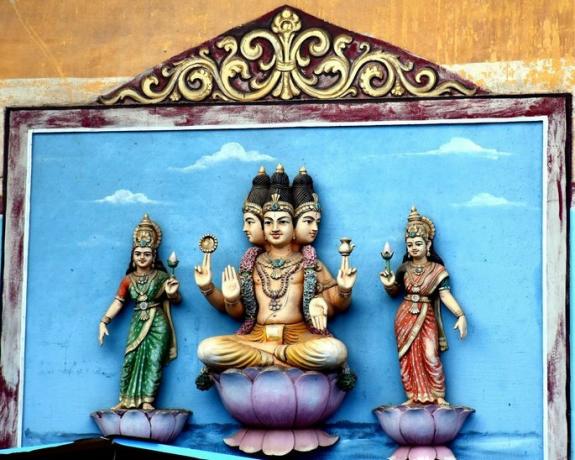
In Hinduism, Brahma is the main entity of Trimurti, a trinity composed of Brahma, Vishnu and Shiva. Brahma represents the balance between the sustaining force of the universe (Vishnu) and the power of destruction (Shiva).
It is also responsible for the human ability to perceive and understand its own existence.
Brahma's mantra is: Oṃ Brahmaṇe Namaḥ.
know more about Brahma.
Shiva
Shiva is the god of destruction and transformation, responsible for the practice of yoga. Shiva yoga would be responsible for physical, mental and spiritual transformation.
Shiva is the third figure of Trimurti, having its own current of Hinduism, Shivaism (or Shivaism), the second most popular current (behind Brahmanism).

One of the main symbols of Shiva is the trident, called trishula, which represents the three gunas (principles that govern the universe):
- Tamas - inertia, resistance and firmness
- Rajas - movement, action and force
- Sattva - balance, purity and tranquility
Shiva Mantra: Om Namah Shivaya
Read more about Shiva.
Vishnu
Vishnu is the restorer of the universe, responsible for balancing the forces of evil and bringing order out of chaos. He is the second figure in the trimurti and the main entity of Vishnuism, the main current of Hinduism (with the largest number of adherents).
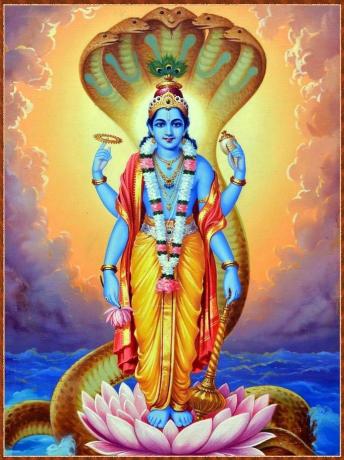
For the followers of Vishnu, he is considered the supreme god, called Mahavishnu.
Vishnu's Mantra: Om Namo Narayanaya
parvati
Parvati is the second wife of Shiva, reincarnation of the first, Sati, and mother of Ganesha. She is considered the Mother Goddess of Hinduism, considered the Goddess of fertility, devotion, marriage, children, love, harmony and divine power.
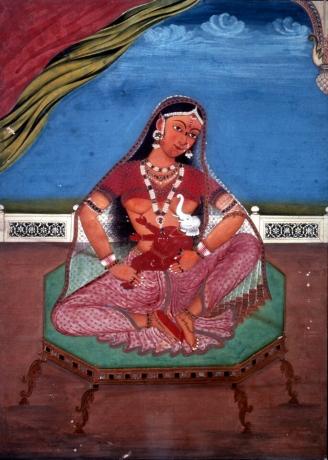
Alongside Saraswati and Lakshmi, she forms the Tridevi, the female trinity of Hinduism. She is considered a loving and gentle maternal deity, who can manifest as Durga or Kali.
While Durga is her figure manifestation personifying maternal love, Kali represents violent justice, death and time.
Parvati's Mantra: Swayamvara Parvathi
Saraswati
Saraswati (Sarasvati) is considered the goddess of wisdom, knowledge and learning. Her figure is also related to the arts, music and public speaking. Saraswati is the shakta (wife) of Brahma.
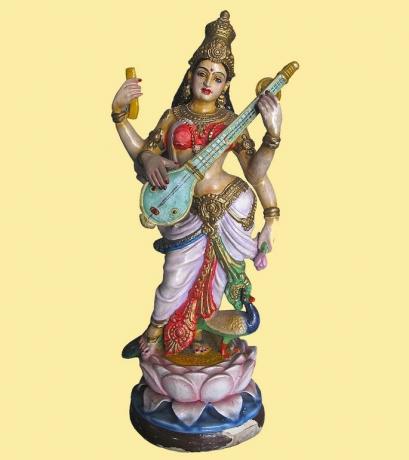
She forms the tridevi (female triad of Hindu goddesses) with Parvati and Lakshmi, which gives her an extremely important place in the cults. She is the goddess who guides students, teachers and writers.
She is usually represented as a light-skinned, four-armed figure, wielding a musical instrument (vina or zither), accompanied by a peacock and a white lotus.
Saraswati Mantra: Om Aim Saraswatyai Namaha
Lakshmi
Lakshmi is the Indian goddess of prosperity, wealth, fertility, good harvest and protector of children. She is Vishnu's wife, being the source of his power.

Lakshmi usually appears accompanied by two elephants, the goddess is understood as an example of virtue and generosity, commonly referred to as The Benevolent or Beauty.
She is also attributed the symbol of the swastika, representing good luck and success.
Lakshmi's Mantra: om Shreem Mahalakshmiyei Namaha
kali
Kali is the goddess of time, conservation, transformation and destruction, often also related to death.
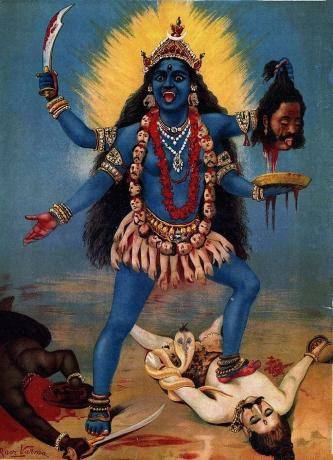
The severed head that Kali bears represents the death of the ego and the elevation to full spiritual life.
Kali Mantra: om krim kalikayai namah
Krishna
Krishna is the Hindu god of love, a warrior god, who fought on Earth alongside the people against demonic warriors.
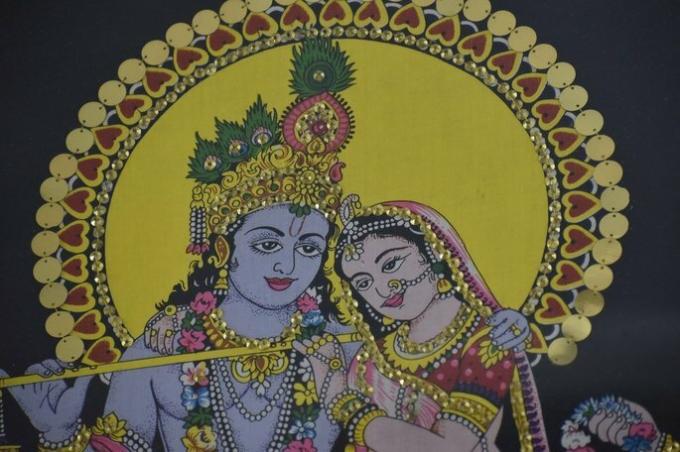
Krishna is a very cultivated god in the West through the Hare Krishna Movement, created in 1966 by Bhaktivedanta Swami Prabhupada.
Krishna's Mantra: Hare Krishna, Hare Krishna, Krishna Krishna, Hare Hare, Hare Rama, Hare Rama, Rama Rama, Hare Hare
See too: Krishna.
Ganesha
Ganesha is Hindu god of abundance, fortune, intellect and wisdom. Son of Parvati and Shiva, Ganesha is one of the main deities of Hinduism, possessing many devotees.

Ganesha is depicted as a god with a human (young) body and an elephant head with only one tusk. Ganesha's unique fang symbolizes overcoming obstacles.
Ganesha Mantra: Om Gam Ganapataye Namaha
Read more about Ganesha it's the Hinduism.
